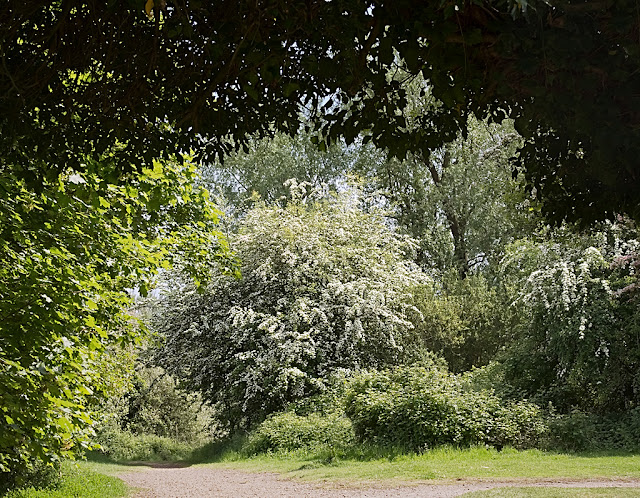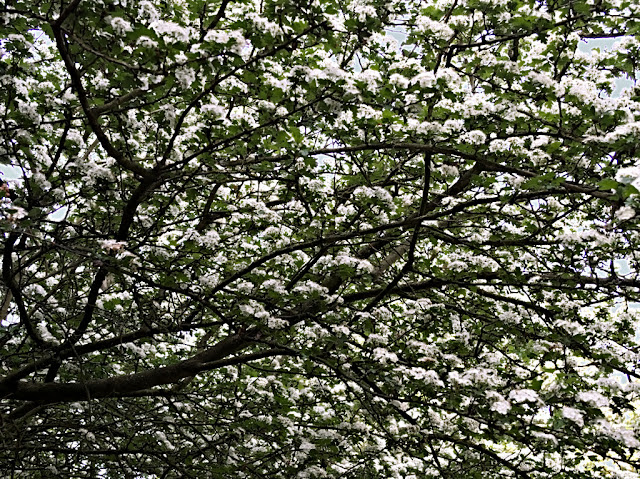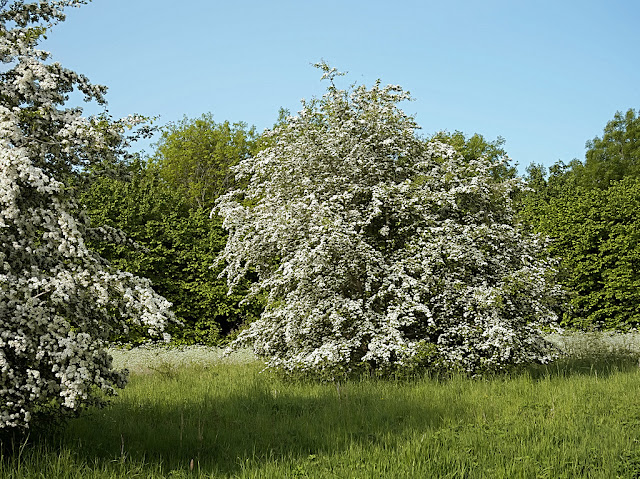 |
| Hawthorn Blossom Framed by Arch of Trees. By Deep Pool - 27 May 2016 |
Hawthorn has been an important part of the landscape for well over a thousand years: it name is derived from the anglo-saxon 'haegthorn' meaning hedgethorn. In those times, it was not only used for hedges, but individual bushes were often important boundary markers. It is not surprising then, that over the centuries, hawthorn has gained many names, including: hedgethorn, quickthorn, whitethorn, may, beltane, and quickset. It has also attracted a great deal of folk lore.
 | |||
| Hedgerow Covered in Blossom. Path by Wetlands - 29 May 2016 |
Hawthorn is perhaps most strongly associated with the month of May, and May Day celebrations in particular. Either
in the evening of April 30th or early in the morning of the day
itself, villagers would go out and gather armfuls of may to decorate
their houses. This symbolised the start of the growing season and
brought new life into the village.
This
is the basis of the expression 'to go a'maying', and also the origin
of the rhyme 'Here we go gathering nuts in May'. Like most nursery
rhymes, I had recited it endlessly, but never thought about the
problem at its very heart – there are no nuts in May. Here 'nuts'
refers to the 'knots' of hawthorn flowers on the branches.
But
May Day is also a fertility celebration, and many who collected
flowers on 30th April would stay out all night
love-making, causing a minor baby boom at this time of year. When
the Christians came to claim this festival as their own, they wanted
nothing to do with such ribaldry, and, instead, turned May into a
month of celibacy and restraint. This has led one author to put
rather a different interpretation on 'ne'er cast a clout till May is
out'. He suggests that it is an instruction not to change one's
clothes at all during the month. Why? Because any sign of sexual
activity will be impossible to detect on such dirty and dishevelled
clothes.
 |
| The Smell of Plague Comes to Milton Country Park. Centre of Park - 22 May 2016 |
More equivocally, is its association with witches. While some believed that witches rode on broomsticks made of hawthorn, others put sprigs of hawthorn over their doorways to keep the ladies out!
 |
| Drug Store or Fairy House? By Fen Road Exit - 22 May 2016 |
It widely believed that fairies lived in hawthorn bushes. In the ballad of 'Thomas the Rimmer', the eponymous hero is abducted by a fairy queen in a hawthorn bush and taken to a fairy kingdom, where he was kept for seven days. So the bush pictured here could be a Harry Potter-like portal to a magic place!
Hawthorn is held to be a veritable super drug store. A bath in the dew of the flowers collected on May Day brings not only a better complexion, but a healthy and lucky future too. Its leaves can be eaten, hence, 'bread and cheese' is one of its many names. Its flowers used to make white wine, and its berries used to make jelly, tea, and a liqueur when soaked in brandy. Its berries can be used effectively against artherosclerosis, hypertension and cardiac arrest!
 |
| A Bush Fit for a Crown By Dickerson's Pit - 29 May 2016 |
Finally, spare a thought for Richard III who had a very bad day at the office on 22nd August 1485 at the battle of Bosworth. Not only did he lose his kingdom and his life, but, also, rather carelessly left his circlet hanging around in a hawthorn bush for his enemies to find.
All this is a fairly superficial romp through the folk lore of hawthorn, of which there is a great deal more. Perhaps, you will be like me, that after reading such tales, you can never look at a hawthorn bush the same again.
I have culled these thoughts from the following sources:
Wikipaedia
Trees for Life
Plant Lore
The Old Foodie
Nature's Calendar
Ecological Flora of the Central Chilterns
Tree Lore: Hawthorn
The Practical Herbalist
Hawthorn: Bride of the Hedgerow
Mayday Lore
The Hawthorn Tree
Next : Elderflower
The Old Foodie
Nature's Calendar
Ecological Flora of the Central Chilterns
Tree Lore: Hawthorn
The Practical Herbalist
Hawthorn: Bride of the Hedgerow
Mayday Lore
The Hawthorn Tree
Next : Elderflower

No comments:
Post a Comment